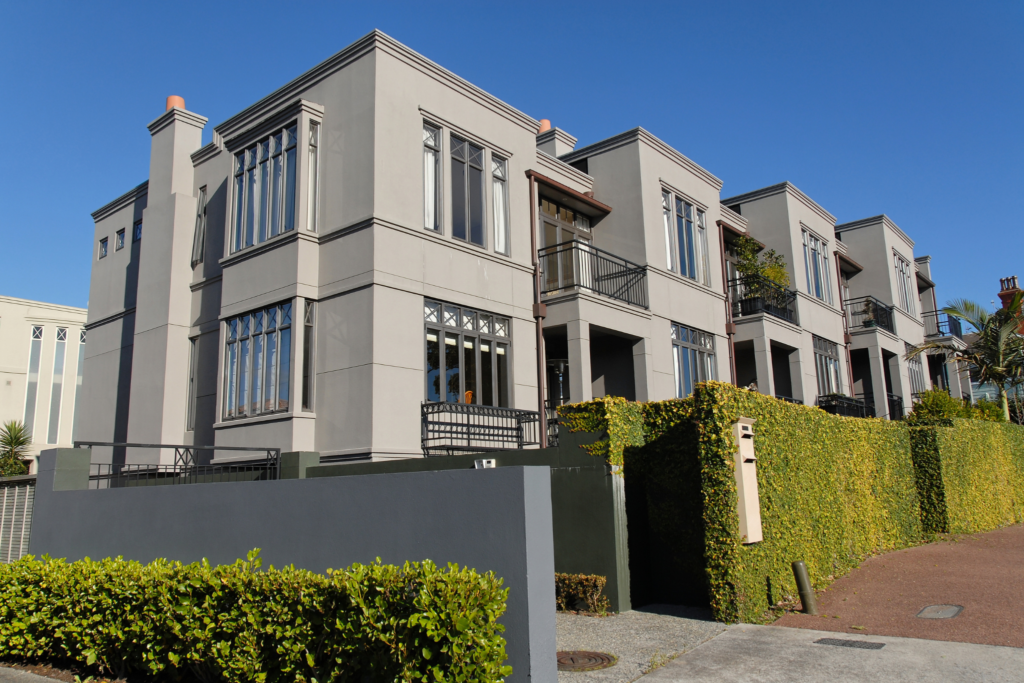
What type of property is the best investment – a unit or townhome? In fact, Suburb Help thinks houses are generally better investments than units or townhouses. But if it’s a question solely of units vs townhomes, Suburb Help would generally favour the latter.
In a moment, we’ll explain why. First, though, we need to stress that the key word is “generally”. That’s because there are some townhomes that would outperform houses and some units that would outperform townhomes. Also, depending on your financial position and property investment strategy, one type of property might suit your individual circumstances better than another.
Townhouse definition Australia
A townhome (or townhouse) is basically a combination of a house and unit. Like a house, a townhome has its own main entrance, even though it’s part of a larger complex (which is the difference between a townhouse and unit). Like a unit, a townhome sits on a strata title and has common areas and common walls with adjacent properties.
The best type of property investment purchase is generally one with some form of scarcity.
When you buy an investment property, one of the main things that will determine its long-term price and rental growth is its owner-occupier appeal. The more the dwelling and suburb appeal to owner-occupiers, the more price and rental growth your investment property will enjoy.
Owner-occupiers generally prefer to live in dwellings that have some sort of individual character. Houses, which are generally built one at a time, tend to have that individuality, whereas townhouses and units, which are generally built in batches, do not.
So as a general rule:
Houses have more scarcity than townhomes and units
Therefore they have more owner-occupier appeal
Therefore they experience more long-term price and rental growth
That’s why Suburb Help thinks houses tend to make better investments than townhouses or units.
But if we look just at units vs townhomes, we can see that townhomes are more likely to have a measure of scarcity than units, because they tend to be built in smaller batches (say 10-20 at a time, rather than 50-100). That leads on to another reason why scarcity is such an important thing to consider when doing property investment research.
Imagine a buyer or tenant decided to buy or rent a property in a high-rise tower. They would know that properties in that tower would be listed for sale or rent on a regular basis. So if they missed out, it wouldn’t be a big deal, as another one would come onto the market soon. As a result, they wouldn’t feel the urge to compete very hard, which would limit the amount of price growth that property could experience over the long-term.
Conversely, if a buyer or tenant showed interest in a house with some sort of scarcity, they would know that missing out would be a big deal, as they would have no idea how long it would be until a comparable home came onto the market. As a result, they would feel the urge to compete hard, which would put upward pressure on prices. A townhome would be in the middle: less scarcity than a house but more than an apartment. And in locations where houses are expensive, townhouses could offer young families a better option than a unit.
The same goes for prices, capital growth and rental yield. As a general rule:
Houses are more expensive than units – with townhomes in the middle
Houses enjoy more capital growth than units – with townhomes in the middle
Units enjoy higher yields than houses – with townhomes in the middle
So if your property investment strategy is to maximise long-term capital growth, you should favour houses then townhomes then apartments, in that order. But if your property investment strategy is maximise yield and cashflow, the order would be reversed – units then townhomes then houses.

One thing units and townhomes have in common is they’re located in strata buildings (unlike houses). As a result, property investors who buy units and townhomes have to follow body corporate rules and pay body corporate fees (unlike those who buy houses). If you’re thinking about buying units for investment or buying townhomes for investment, it’s generally a good idea to get a strata inspection report as part of your due diligence.
The strata inspection report will provide you with a wealth of intelligence about the strata building (also known as the strata scheme), such as:
The state of the building’s finances
How much you’d have to pay in quarterly levies
How well the building is being maintained and managed
What your voting rights would be
Whether the building has any defects
Whether the building is properly insured
Whether the building is compliant with fire and asbestos regulations
Whether there are any disputes occurring between the owners
From a strata perspective, apartment buildings aren’t necessarily any better or worse than townhome buildings. So they can only be compared on a case-by-case basis.
History suggests that if you buy a quality property in a quality location and hold it for the long-term, you’ll enjoy significant price growth and rental growth. That’s why so many Australians use property investing as a way to build wealth for retirement. History also suggests that houses tend to make better long-term investments than townhomes, while townhomes tend to outperform units. That said, there are numerous property investors who have done well choosing units or townhomes over houses. So while the issue of units vs townhomes is important, it’s probably more important to take action, because the sooner you start investing, the sooner you can start enjoying the magic of compound growth.
If you’re unsure where to buy your investment property, you can hire a national buyer’s agent or property strategist to do your research for you and make recommendations on suitable locations. Once you’ve shortlisted several locations, you’ll need to study the different local markets to understand what makes a good asset in each of those places.
Alternatively, if you’ve already chosen a property investment location but you don’t have the expertise to conduct due diligence on properties, negotiate with real estate agents and understand what a fair sale price would be, you can hire an experienced local buyer’s agent to do this highly specialised work for you. That will improve your chances of buying a high-quality investment property, whether it’s a unit, townhouse or house.
Suburb Help can introduce you to a skilled, ethical buyer’s agent in your area.
Copyright Suburb Help | Terms of use | Website by Clickk